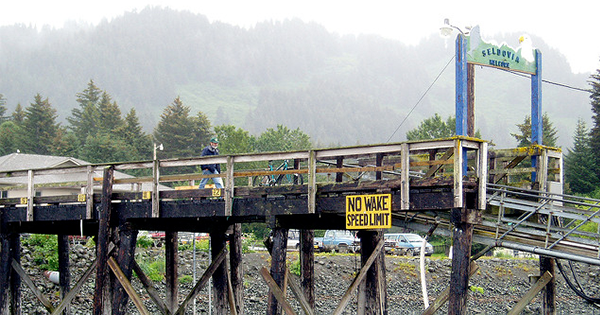
Homer filled up for Memorial Day weekend, so we took our boat across the bay and spent two nights in Seldovia, a community of about 300 people. Seldovia was a Native settlement and trading place for thousands of years until fur-hungry Russians arrived and planted a church atop a rocky knoll. For about a century, Seldovia—with its deepwater anchorage and ice-free port—was the shipping hub for all of Southcentral Alaska and the main fishing port in Kachemak Bay. Homer residents used to boat to Seldovia to stock up on groceries. But now the main grocery store there is closed, and the community is a sleepy place—one bar, three or four restaurants (depending on who wants to be open), a tiny general store crammed with food and other essentials.
We loaded bikes, sleeping bags, a cooler of food, and camp chairs onto the back of our boat, a 21-foot wooden skiff with a small cabin. It was sunny and breezy when we pulled out of the harbor, which, these days, feels like its own bustling town. Charter boats zoom off in the early morning on their commute to halibut holes. Commercial fishing boats tie up at the public fish docks, where yellow, two-story cranes help them gear up for the season. Water taxis pull in for minutes along the harbor floats before loading passengers and gear and zooming away. The floating fuel station is thronged.
But as soon as we pulled out of the harbor, the bay opened before us, spacious and wild. Wind had kicked up a small bump on the water, making the trip slow going. But along the way, we saw humpback whales and sea otters, and we were happy.
Each year, I forget that I live in a tourist town. That might sound naïve, stupid perhaps, or just untrue. But every summer, I am honestly surprised by how, once again, the town where I live morphs into a completely different place. Now we have to wait in long lines at our beloved bakery. We get stuck for ages if we try to make a left turn at any of the traffic light-less intersections, and parking at the top of the harbor ramp costs five bucks. Memorial Day weekend is the official start to the paid parking and the craziness, although the town has felt different for the last month. RVs have popped up like mushrooms the spring after a burn. Reality TV crews will arrive soon in their fashionable jeans. And passengers from twice monthly cruise ships walk around—perhaps dismayed that our town isn’t more picturesque as they pass the auto shop or stroll by parking lot after parking lot.
Even as we begin to embrace the summer buzz, we don’t realize just how busy Homer is until we get to Seldovia, where kids and dogs walk down the middle of the main drag, and where you can sleep on your boat in the harbor and not get woken at five A.M. by a fleet of charter boats powering up.
It was a charmed—and charming—weekend. We parked our boat next to our friends’ 30-something-foot boat, which has a small kitchen, dining area, and head. We set up our camp chairs on the harbor floats and read the newspaper while the kids fished off the dock. We biked to a beautiful beach of cobbles and crashing waves, where the girls searched for ocean-worn glass. Our friends took us halibut fishing on their boat the morning after we arrived, and we came home with plenty. That evening, we brought potluck dishes to a community fish fry to celebrate the town’s annual hand-powered fishing derby that had happened the previous day. Everyone who entered the derby—fishing by rowboat or kayak—won a prize.
Sitting at the potluck was an experience I don’t often have: being a tourist in someone else’s small town. The gathering was familiar, with local volunteers setting up the event, organizers giving away prizes that had been donated by local and Homer-based businesses: store gift certificates, roundtrip flights across the bay. All to people they knew. We weren’t the only tourists in town—the state ferry was fully booked on its return trip to Homer on Monday, and all four restaurants were busy. I’m sure folks over there are looking forward to having a little more elbowroom too.

